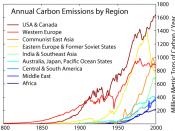1. When related to range and game organization, carrying capacity is generally defined as the highest populace of a specified species that can be sustained for the foreseeable future in a definite habitat, devoid of permanently harming the efficiency of that habitat. Nonetheless, due to our apparent capability of increasing our personal carrying capacity by eradicating contending species and importing the needed locally sparse resources, this description seems inappropriate when related to humans. Approximating the carrying capacity of the world is a complex undertaking relating to assumptions and value-based decisions. Whether the potential of the earth consists of a crowded populace of humans, amid condensed biodiversity and tarnished ecological traits, or, a less significant population existing in conjunction with a diverse foundation of resources is beyond our knowledge. If the human race intends to exist at rates close to its modern level of survival, present standings of energy use and the imminent exhaustion of non-renewable power sources shine light on the need for an alteration in both population expansion and utilization trends.
A dwindling carrying capacity could quickly develop into an important concern facing humanity. This becomes more clear when you describe carrying capacity not as a maximum population, but rather as the greatest burden that can safely be placed on the environment by the citizens. The load from humans is a role not just of population, but furthermore of per capita expenditure. The latter of the two is escalating quicker than the former as a result of expanding technology and trade. Due to such trends, load demands comparative to carrying capacity are increasing much more rapidly than what is implied via simple populace increases. To conclude, this is why knowing the earths carrying capacity would be important.
2. Yes. One reason for the explosive interest in the precautionary principle...


